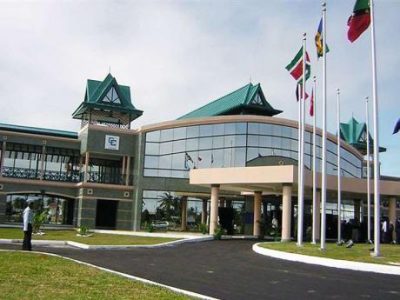Powerful States and Corporations Deploy International Institutions to “Shape Rules” According to Their Interests and Agendas
A Response to the Article by Jamaica Gleaner Entitled "CARICOM Calls for De-escalation of the Venezuela-Guyana Border Conflict"

All Global Research articles can be read in 51 languages by activating the Translate Website button below the author’s name (only available in desktop version).
To receive Global Research’s Daily Newsletter (selected articles), click here.
Click the share button above to email/forward this article to your friends and colleagues. Follow us on Instagram and Twitter and subscribe to our Telegram Channel. Feel free to repost and share widely Global Research articles.
New Year Donation Drive: Global Research Is Committed to the “Unspoken Truth”
***
“Following a weekend referendum on December 3, 2023, Venezuela has given directives from state-owned enterprises to begin exploiting the mineral and oil-rich region of Essequibo.” — Excerpt from the Jamaica Gleaner, December 8, 2023
Venezuela’s directives signify an unlawful action with respect to the regulations and principles under public international law. According to the Article 2(4) of the United Nations Charter, states are prohibited to use force against another state in their relations and under Article 8 of the UN Montevideo Convention on the Rights and Duties of States, no state shall intervene in the internal and external affairs of another state which also could be expanded to attempts to annex territory.
Furthermore, the International Court of Justice (ICJ) has ruled in its provisional statement that neither Venezuela nor Guyana should make decisions or enact actions that would aggravate the dispute settlement process over the Essequibo region. Through a critical, public international law perspective, one could argue that the Venezuela-Guyana border dispute reinforces the limitations of public international law whereby there are weak enforcement mechanisms to ensure that rules, regulations and principles are adhered to among states.
International relations and law expert, Professor Stephen McGlinchey (2022; December 2023) postulates that there is no sovereign international body or institution to impose punishment on states in the way individuals would be prosecuted for a crime within domestic courts using domestic jurisdictions.
Other public international law and relations scholars such as Kevin Bloor (2022) have noted that the International Court of Justice (ICJ) is weak its procedural, independent and authority capacity and consequently, member states can avoid their legal obligations regardless of the judgement.
Both McGlinchey’s and Bloor’s legal assertions are quite applicable to the Venezuela-Guyana dispute because it shows how the actions and pronouncements of states aggravate the dispute settlement process in defence of their national self-interests. Additionally, effective enforcement of the court’s ruling is highly dependent on the consent of the states to accept the court’s jurisdiction that in fact, a violation of public international law has occurred.
Another angle, one could utilize to examine the recent Venezuela-Guyana border dispute is through the lens of third world approaches to international law (TWAIL). Third World Approaches to International Law (TWAIL) argues that public international law has its roots in colonial origins and this, hierarchal structures with respect to sovereignty and there is continual renewal of imperialist domination (Serpi, 2023).
One of the reasons for the escalation is the fact that it dates back to as far as 1899 Paris Arbitration Award when both countries (Guyana and Venezuela) were still under colonial rule.
The case also highlights the pivotal role of overseas, transnational corporations and industrialized countries such as the United States of America.
Venezuela’s mineral dependency or resource curse dilemma is worsened by the fact that the US has imposed economic sanctions on its petroleum oil industry which has had significant impact on the country’s social and economic development. This is seen in growing social unrests, political instability, food insecurity, poverty, mass suffering and decadent state-run institutions which explains why Venezuela is so adamant in exploring mineral and oil-rich industries in Essequibo. For Guyana, the petroleum exploration and refinery company, Exon Mobbil has amassed profits of US$17.9 billion while poverty and inequality among low income and disenfranchised Guyanese have increased.
USA also plays a major role in covering the legal fees of Guyana in defence of its case at the International Court of Justice (ICJ) hearing. These underlying social and economic issues perpetuates existing asymmetries between the Global North and Global South where powerful states and corporations deploy international institutions to shape rules according to their interests and agendas.
*
Note to readers: Please click the share button above. Follow us on Instagram and Twitter and subscribe to our Telegram Channel. Feel free to repost and share widely Global Research articles.
Tina Renier is an independent researcher based in Jamaica. She is a regular contributor to Global Research. Her areas of research interests are international development, with special emphasis on labour and development, education and development and women, gender and development.
Sources
Bloor, K. (2022). Understanding Global Politics. Bristol, England: E-International Relations Publishing.
McGlinchey, S. (2022; 8 December 2023). Human Rights and Sovereignty . Bristol, England: E-International Relations Publishing
Serpi, L.A. (15 December 2023). Nuclear Non-Proliferation and the Imperialist Dynamics in International Law. Bristol, England: E-International Relations Publishing.
Featured image source

